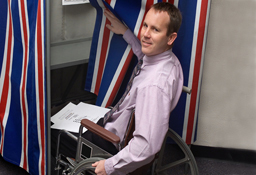
Voters went to the polls on November 3rd and Republicans emerged as the winners in a few key states.
Momentum Creative Group/Alamy
Republicans Make Gains in 2009 Election Races
The 2009 off-year elections did not match the enormous excitement of the 2008 presidential election. Only two governors’ races and two special congressional elections were held nationally. These major contests attracted interest, however. People were curious as to whether President Barack Obama’s performance thus far in office would affect how Democrats, Republicans, and Independents voted.
After losing the White House and Congress in 2008, the Republicans gained some ground in the 2009 election. In Virginia and New Jersey, Independent voters helped decide the outcome. In 2008, Independents largely supported Obama’s election. A year later, they generally sided with the Republicans, despite President Obama’s active support for the Democratic candidates.
According to exit polls, voters were uneasy about the economic recession. Many also described a growing distrust of government. This seems to have fueled the Republican wins in Virginia and New Jersey. However, the polls also showed that voters made decisions based on local and state issues—not positive or negative views of the president.
Republican gains in the governors’ races were balanced a little by the loss of a congressional seat in upstate New York to the Democrats. This seat had been in Republican hands since the late 1800s. Some observers believe that local disagreements between conservative Republicans and moderate Republicans played a major role in the GOP defeat.
To view election results, visit a national news Web site such as CNN or The New York Times.
Governor’s Race in Virginia
The 2009 elections gave Virginia Republicans the chance to turn back Democratic gains. In the race for the governor’s seat, Republican Bob McDonnell, a former state attorney general, defeated Democrat Creigh Deeds, a long-time state senator. The Republicans also won races for Virginia’s lieutenant governor and attorney general. Their clean sweep of major state offices ended eight years of Democratic control in Richmond (the state capital). According to exit polls, McDonnell outpaced Deeds among Independents in Virginia, despite Obama’s strong showing among this group of voters a year ago.
Most Virginia voters stated that local issues influenced their vote in 2009, not the policies of President Obama. Political observers believe that the Virginia race shows that Democrats cannot automatically count on support from Independents who support President Obama.
Governor’s Race in New Jersey
On Election Day New Jersey voters chose Republican Chris Christie, a former federal prosecutor, over the incumbent, Democratic governor John Corzine. Independent candidate Chris Daggett, a former state and federal environmental official, won only a small percentage of the vote. Christie was the first Republican to win the governorship in heavily Democratic New Jersey since 1997.
As in Virginia, many Independent voters in New Jersey who had voted for Obama in 2008 switched to the Republican side in the 2009 election. Economic issues dominated the New Jersey governor’s race. Despite Obama’s help in the campaign, Corzine was burdened with the effects of the economic recession. Republican candidate Christie accused Corzine of mismanaging the state’s economy. He blamed the Democratic governor for rising joblessness, ongoing state budget deficits, and skyrocketing property taxes. Although Christie offered few details about how he would fix the state’s economic woes, voters were eager for a change.
Special Congressional Races
Elsewhere on Election Day 2009, special elections were held in New York and California to fill two vacant seats in the U.S. House of Representatives. In a Northern California district, California’s Democratic lieutenant governor John Garamendi won a congressional seat. His victory kept the district in Democratic hands.
In an upstate New York district, Democrat Bill Owens defeated Conservative Party candidate Doug Hoffman in a race for a congressional seat that had long been held by Republicans. The race was shaped by feuding within Republican ranks.
Local Republican leaders picked Deidre Scozzafava as their candidate, hoping that her moderate Republican views would appeal to Independents and Democrats. This decision sparked a revolt among Republican conservatives. They decided to back Doug Hoffman, an accountant, who ran on behalf of New York’s Conservative Party.
The race attracted national attention when Hoffman’s candidacy drew the support of prominent conservative Republicans, such as radio talk-show host Rush Limbaugh and former Alaska governor Sarah Palin. Under pressure from conservatives, Scozzafava dropped out of the race and then endorsed the Democrat Bill Owens.
Owens’s victory brought one piece of good news to the Democrats. It also represented a struggle among Republicans about the direction of the party. Infighting in this case cost the party a historically Republican seat. If feuding between Republican moderates and conservatives becomes a nationwide trend, efforts to rebuild the party and make a comeback could be affected.
Future Impact
Political observers differed regarding the significance of the election and its impact on the future. Some believe the results reveal what may be the beginning of a Republican comeback at the state level. Results may also show the limits of President Obama’s ability to convince many of his 2008 supporters to back other Democratic candidates.
Many Republicans hailed the election results as a clear sign of a GOP comeback. “I fully expect this trend to continue in the coming months,” said Michael Steele, the chairman of the Republican National Committee, “and President Obama and Democrats should have reason to fear the upcoming elections in 2010.”
While Democrats were disappointed in the results, leaders cautioned that the impact of the election results should not be exaggerated. Tim Kaine, Democratic National Committee chairperson, stated: “These races turned on local and state issues . . . and despite what some will certainly claim, the results are not predictive of the future or reflective of the national mood.”
DIG DEEPER!
David Martin


